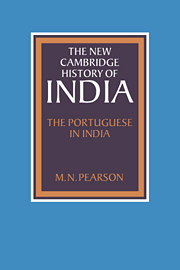1 - The Portuguese arrival in India
Published online by Cambridge University Press: 28 March 2008
Summary
Vasco da Gama's arrival near Calicut on 20 May 1498 was the culmination of a continuous, though spasmodic, Portuguese thrust into the Atlantic, south to the Cape of Good Hope, and on to India. This process began in 1415 when the Moroccan city of Ceuta was conquered. The Madeira and Azores islands were settled by Portuguese in the 1420s and 1430s, and in 1434 treacherous Cape Bojador was rounded. Great strides were made in the 1480s, culminating in the rounding of the Cape of Good Hope by Bartolomeu Dias in 1488. There followed a brief and rather mysterious hiatus, until de Gama's three small ships left Lisbon in July 1497. After spending May to October 1498 off the southwest Indian coast, he returned to Portugal in August 1499; not surprisingly, he was welcomed ecstatically.
The king, D. Manuel (1495–1521), immediately undertook extensive public works in Lisbon, designed to foster trade and future expeditions. Preparations for the second expedition, commanded by Cabral, were accelerated: he left in March 1500 with a huge fleet of thirteen ships and at least 1200 men. The sense of confidence and exultation of the time can be seen in the way work was started late in 1499 on the huge monastery of the Jeronimos in the suburb of Lisbon on the Tagus River from which the fleets left for India. Even more indicative was the renaming of the area where the monastery was to be erected (it took fifty years to complete): it was to be known henceforth as Belém (Bethlehem), the place where the Portuguese empire was born.
Keywords
- Type
- Chapter
- Information
- The Portuguese in India , pp. 5 - 39Publisher: Cambridge University PressPrint publication year: 1988



